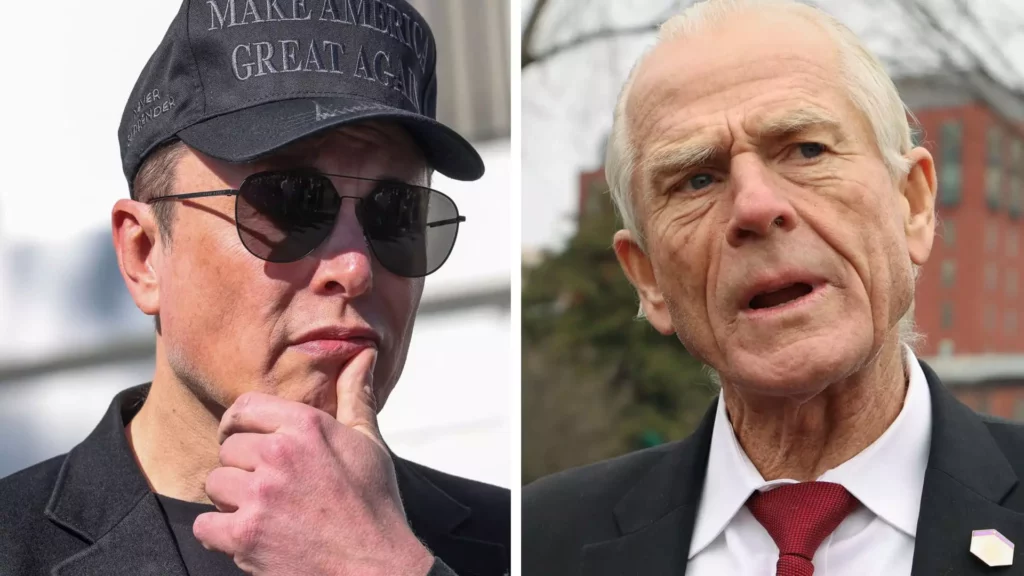In an unexpected and heated exchange, Elon Musk, the man behind the electric car revolution, has had a very public fallout with Peter Navarro, economic advisor under the Trump administration. This confrontation isn’t merely a personal spat; it highlights a critical ideological divide that reverberates across America’s tech and automotive landscapes. Musk’s willingness to engage directly with Navarro, questioning his credentials and competence, reveals a deep-seated frustration not just aimed at the man himself but rather at the larger economic policies influencing American industries.
The public nature of Musk’s assault—dismissing Navarro’s prestigious Ivy League Ph.D. as a liability—underscores a moment where the wealthiest individual in the world feels compelled to confront government authority. This is not just a fight for pride; Musk’s battle taps into the very norms of economic discourse and illustrates the anxiety surrounding trade policies that have been sweeping through American markets.
Implications of Tariff Policies on American Ingenuity
Musk’s social media duel only intensifies when considering the broader ramifications of recent tariff implementations. Navarro’s disparaging characterization of Tesla as simply a “car assembler” has ignited a firestorm of criticism from Musk, who labeled him “dangerously dumb.” This heated rhetoric signals a desperate urgency in grappling with constricting economic parameters. Tariffs are positioned as protective measures for American jobs, yet the unintended consequences often wield a double-edged sword, potentially impeding the innovation and growth of the very companies they seek to safeguard.
With Tesla’s stock falling 22% over a mere four trading sessions and losing nearly 45% for the year, it is evident that these tariffs have created an environment of volatility and uncertainty. Musk’s aggressive defense of Tesla is more than just professional pride; it is about the survival of a pioneering company that has set its sights on redefining global automotive standards. The anxiety surrounding soaring production costs due to tariffs pushes Musk into a corner where public confrontation becomes a tool for control.
Cracks in Tesla’s Armor: The Quest for Direction
Adding fuel to the fire is Tesla’s troubling performance metrics; a 13% decline in annual vehicle deliveries combines with escalating external pressures to signify a tumultuous period for the automaker. The challenges Musk faces are not limited to tariff-related hardships alone; they also disturbingly reflect the broader systemic issues within Tesla’s operations and its ability to meet consumer demand.
In these unpredictable conditions, Musk’s vocal incitements against government policies serve a dual purpose: they provide a much-needed rallying cry for stakeholders while simultaneously acting as a strategic maneuver to reinvigorate public sentiment regarding Tesla’s trajectory. This approach, however, raises questions about the level of decorum and professionalism expected from leaders of major corporations. Public disputes of this nature, while flashy, might obscure the serious policy discussions that need to occur for real progress.
A Vision for Interconnected Trade: Musk’s Bold Proposal
Despite the heaviness of the conflict, Musk is also putting forth a visionary idea: a zero-tariff trade relationship between the United States and Europe. This suggestion contrasts sharply with Navarro’s protectionist stance and reflects a more collaborative approach that could benefit various sectors, including the technology and automotive industries. Musk’s investments in European manufacturing, especially his gigafactory in Germany, indicate an awareness that economic resilience might be found in global interconnectedness rather than isolationist policies.
This vision is not just theoretical; it embodies the optimism needed to navigate turbulent waters, positioning Musk as a potential bridge-builder rather than a divisive figure. The challenges posed by tariffs and trade barriers could be alleviated through such policies, allowing for streamlined operations and broader market access for American companies. Unfortunately, his raw and often combative exchanges may dilute that message, focusing attention more on Musk’s personality than on the innovative ideas he seeks to champion.
Breaking Ranks: A New Era of Corporate Advocacy?
Underneath the vitriol lies an interesting dynamic—a perceived willingness of influential business leaders, like Musk, to break ranks with government advisors when their interests come under threat. Musk’s public critique of Navarro could indicate a changing tide, where CEOs increasingly assert their political views, challenging the traditional notions of corporate silence in civic engagement.
This is a noteworthy juncture in American economic discourse. The friction represented by Musk and Navarro’s interactions could very well be the catalyst for a future where corporate leaders proactively shape economic policy discussions, straddling the line between advocacy and accountability.
The intersection of technology, economics, and politics has never been more illuminated than it is through this confrontation, offering insight into the potential shaping of economic policy in a landscape that is becoming increasingly fraught with complexity and challenges. As we watch this saga unfold, it signals that the path forward is laden with both opportunity and peril, necessitating conversations that encompass a nuanced understanding of the global economy.









Leave a Reply